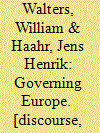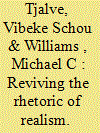|
|
|
Sort Order |
|
|
|
Items / Page
|
|
|
|
|
|
|
| Srl | Item |
| 1 |
ID:
058914


|
|
|
|
|
| Publication |
London, Routledge, 2005.
|
| Description |
vii, 168p.
|
| Series |
Routledge advances in European politics
|
| Standard Number |
0415321980
|
|
|
|
|
|
|
|
|
|
|
|
Copies: C:1/I:0,R:0,Q:0
Circulation
| Accession# | Call# | Current Location | Status | Policy | Location |
| 049180 | 341.2422/WAL 049180 | Main | On Shelf | General | |
|
|
|
|
| 2 |
ID:
153050


|
|
|
|
|
| Summary/Abstract |
This article argues that the intelligence sector is a privileged vantage point to observe and analyse a transformation of the State in France, as this transformation deeply affects the heart of the executive power and the French intelligence and security apparatus. Traditionally, intelligence was not conceived in France as a functional tool in the hands of the decision-maker but was rather defined as a ‘regalian power’. Intelligence activities were derived from a very specific conception of the State, and especially the particular notion of ‘reason of State’ (raison d’État). The current intelligence reform prompts speculation as to whether it represents more than a ‘simple’ functional reorganisation or in fact could signify that intelligence is now recognised as a tool in the hands of a ‘État de droit’ (‘liberal state’). The idea of a French ‘exceptionalism’ is addressed through a theoretical approach of the way France redefines intelligence and surveillance in relation with a major evolution of the notion of ‘reason of State’ itself. Then the article illustrates the assumption of a ‘lost tradition’ of reason of State through an analysis of the current reform of the intelligence sector in France. This reform is based on processes of rationalisation, centralization, modernisation and normalisation of both intelligence activities and intelligence services in France. As a conclusion, the article addresses the reactions to the January and November 2015 terrorist attacks in Paris, and asks whether resilience towards terrorism requires to accelerate the pace of the transformation of the French intelligence sector.
|
|
|
|
|
|
|
|
|
|
|
|
|
|
|
|
| 3 |
ID:
138850


|
|
|
|
|
| Summary/Abstract |
In both disciplinary history and contemporary methodology, realism is conventionally cast as the antithesis of rhetoric. Born in reaction against the empty liberal rhetoric of interwar liberalism and espousing a robust materialism and rigorous rationalism, realism often seems the obstacle that rhetoric’s focus on language, narrative, and social construction must inevitably confront and the challenge around which debates must again inevitably revolve. This article challenges this vision of the relationship between rhetoric and realism. Returning to the birth of international relations in the immediate post-war era, we demonstrate that early realists perceived rhetoric as central to action in domestic as well as international politics and that it was particularly important in the United States. This realist rhetoric is marked by an engagement with grand politics, with the relationship between rhetoric, political identity, social mobilization, political leadership, and foreign policy. Rather than taking either the American state or its national interest for granted, post-war realists sought to counter the dangers of the dominant historical rhetorics of American foreign policy and to develop an alternative rhetoric that could insulate American democracy from destructive tensions and provide the basis for robust and responsible action in world affairs. Recovering the relationship between realism and rhetoric is important not only in challenging disciplinary and methodological orthodoxies that obstruct creative theorizing, but also for its incisive contributions to thinking about American foreign policy amidst the profound changes and challenges it confronts today.
|
|
|
|
|
|
|
|
|
|
|
|
|
|
|
|
|
|
|
|
|